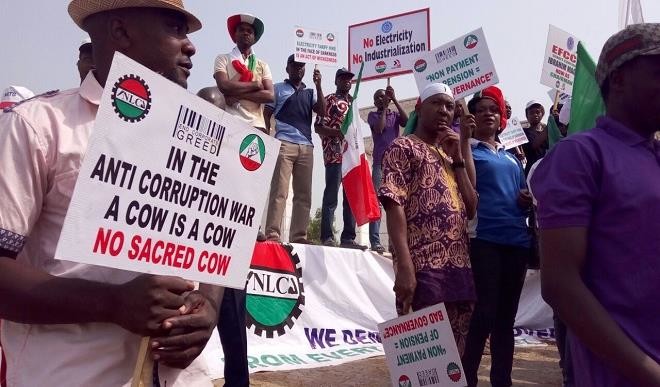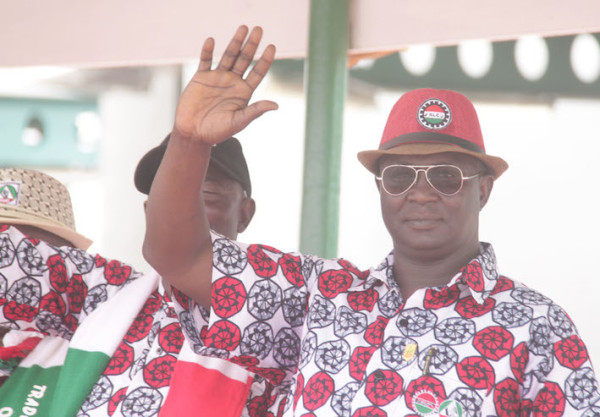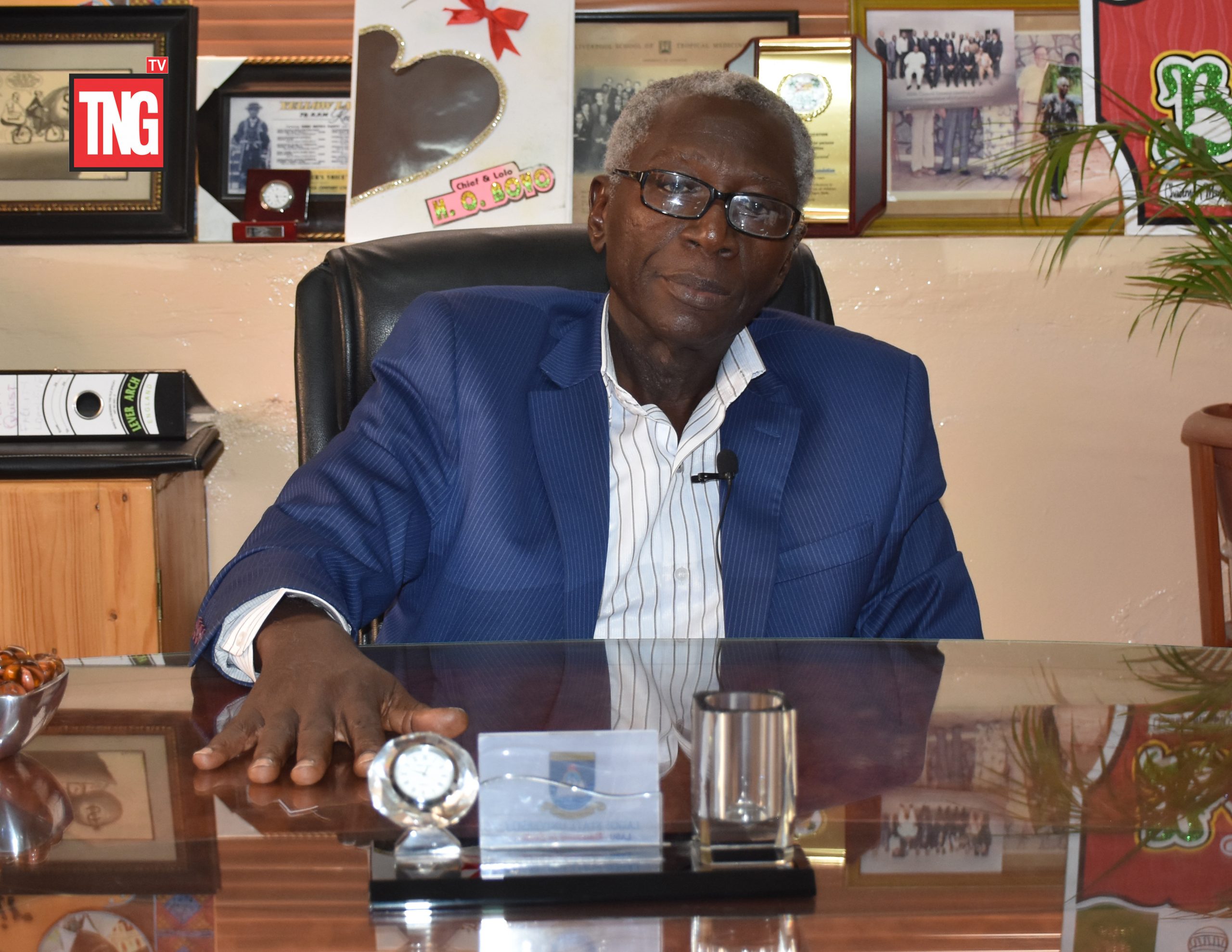By Henry Boyo
President Buhari established a Tripartite Committee in Dec. 2017 – comprising Labour Leaders, Federal and State Government representatives, to consider and recommend an appropriate increase on the present N18,000/month, National Minimum Wage, which became effective from 2011.
Ultimately, however, by Oct. 2018, after protracted negotiations, over several months, there is still no agreement, because the State Governments have insisted on paying only N22,500, while the Federal Government, conversely ‘appears’ willing to accept N30,000/month, despite Labour’s demand for between N36,000-N56,000 minimum wage. Nonetheless, Labour has lately also settled for N30,000/month ($84).
Arguably, despite the serial increases in Minimum Wage from N3,000 ($35) in 1998, to N5,500 ($55) in 2006, respectively, before the subsequent increase to N18,000 ($111.0) in 2011, the average real income and purchasing power of Nigeria’s workers, has regrettably, failed to match the real value of the N125/month ($290), Minimum Wage which prevailed in 1981, when reserves hovered well below $10bn.
The following narrative is a summary of an article which was first published in Vanguard Newspaper in December 2006, with the title “More Money or Better Value”. Regrettably, Labour Leaders have unexpectedly still failed, on hindsight, to learn the important lesson that nominal wage increases may not necessarily translate to sustainable higher purchasing power or improved lifestyle. Please read on.
“Nigerians and the Labour Unions, particularly clamour, inexplicably, for optically larger incomes rather than make clear demand for sustenance of the real purchasing value of their incomes. Instructively, the Naira was once equal to the British Pound Sterling, while $1 exchanged for about 50 kobo before 1976. Indeed, it was uncommon, then for Nigerians, resident or studying abroad, to send money back home to Nigeria, or as supplementary income for dependants back home; invariably, the dream of most Nigerian youths, was to return to the comfort of home and friends and the ‘better life’ in Nigeria.
Today, the number of Nigerians who can educate their children abroad from income derived from legitimate wages or enterprise, as opposed to the proceeds of treasury looting and other such corrupt engagements, has diminished significantly. Worse still, we, now train our children, ironically, with scarce available resources, only to release them, thereafter, into a jobless market, which encourages them to seek, as greener pastures, extremely mean jobs abroad! But who cares? This desperation of youths ‘to check out,’ has clearly evolved with the increasing loss in the Naira’s purchasing power!
There are basically two main ways in which the currency of a country can lose value; these are by an uncontrolled inflationary spiral (unabated rising prices of goods and services over time) and/or by, steady depreciation or indeed from an actual formal devaluation by the respective monetary authorities! In our case, both factors have conspired to deflate the Naira and wreak havoc on our value system, our lifestyle, and our hope and aspirations, both as individuals and as a people.
Consequently, as naira continued to depreciate from stronger than parity (N1=$1.1) to its current rate of N130=$1 (2006) , the implication is that an average family with N10,000/annum income in 1980 would, invariably, require a minimum salary of N1,300,000/annum, in 2006, to sustain their accustomed lifestyle; the gargantuan fall in real income value is primarily responsible for the evident devastation caused by spiraling inflation over the last 25 years; for example, a bag of rice which cost less than N20 in 1980 now costs over N7000 (2006), a finger of plantain which cost less than 10 kobo now costs over N20 each. Thus, an average Nigerian family, would require over N2m in 2006 to maintain the same lifestyle sustained with less than N20, 000 in 1980; but pray, what percentage of Nigerians, currently earns such money after the decimation of the middle class by the evil twins of devaluation and inflation?
Indeed, in order to bridge the widening gap between bloated wage packets and dwindling purchasing value, the Federal Government approved a 15% wage increase for all civil servants with effect from January 2007 (Guardian Newspaper of 20/12/2006-Pg.5). Notably, under normal circumstances, any attempt to bridge the poverty gap caused by loss in purchasing power of incomes would be welcome, but in a situation where already, the monetary authorities, fervently decry the presence of surplus money supply (otherwise known as excess Naira liquidity) in the system, and the inflationary potential rise in petrol pump prices (with the notice of subsidy reduction indicated in 2007 budget), plus the equally legitimate pressure, for government to spend more on improvement of dilapidated infrastructure, it may be a pipedream to expect that the recently approved bigger quantum salaries, will bring succor to income earners. Although, any increase in minimum wage will, nominally increase wages and salaries, however the collateral loss in Naira purchasing value, will as usual, leave majority of our people poorer than they were before!
I never cease to be amazed that inspite of this recurrent cycle of increasing salaries and incomes and the consequent abiding poverty, our Trade Unions continue to clamour for quantum income elevation, rather than demand that the income they earn, receive better value, such that the same income will buy more and more rather than less and less! Sadly, Labour Leaders, seem blindly enamored by the theme of the bigger the better, but they obviously fail to see that less could command better value!
“I have advocated in several articles in this column that the naira in our pockets, can and will buy more, if the Naira value is not continuously debased by the conversion of Nigeria’s export dollar earnings into naira before sharing to the three tiers of government. The need to consolidate the naira equivalent from the money market as well as the additional currency printed for this purpose, remain the bane of our monetary system. So long as this system persists, the naira will continue to be under pressure and will depreciate, even in the face of rapidly rising external reserves; this is an economic paradox, if ever there was one!”
Conversely, if CBN releases its stranglehold monopoly, on the supply side of the foreign exchange market, by allocating the dollar component of the federation’s distributable pool with dollar certificates, Naira’s purchasing value will quickly improve and possibly exchange below N50=$1, as more dollar values chase limited naira supply; in such event, all the economic policy shenanigans which have brought additional suffering to the masses will evaporate, while inflation may actually drop below 1% to push down interest rates below 5-7% i.e. the requisite parameters for real growth in a sensibly managed economy. The monetary authorities and Labour Leaders know this, but the watchword is for self rather than communal interest. Heaven help us!”
SAVE THE NAIRA, SAVE NIGERIANS!!!


